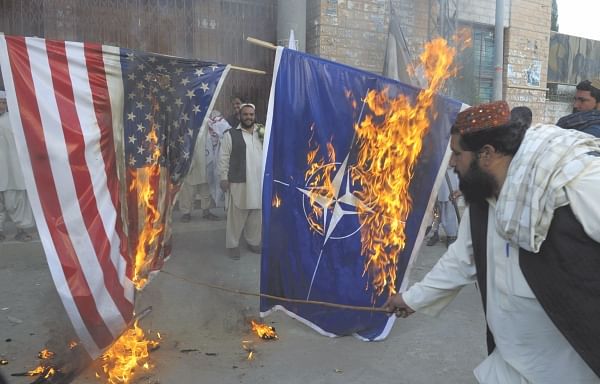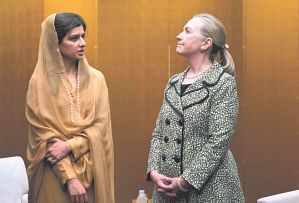| Home - Back Issues - The Team - Contact Us |
 |
| Volume 11 |Issue 28| July 13, 2012 | |
|
|
International
A Timely Rescue Cyril Almeida The dramatic, synchronised announcement of a breakthrough in stalled ties with the US last Tuesday took most officials, diplomats and observers in Islamabad by surprise. That a deal would eventually be worked out was accepted in many quarters — stubbornness notwithstanding, neither the US nor Pakistan had indicated that it wanted ties to break down entirely — but the timing was unexpected. The suddenness of the apology-cum-reopening deal has fuelled speculation that both sides saw the window of opportunity for an agreement was on the verge of closing: July 4, Independence Day in the US, offering a final chance for American officials to slip in an apology before the US presidential election campaign kicks into high gear. The weekend of July 4 has seen drama in the Pak-US relationship before: in 1999, then-prime minister Nawaz Sharif rushed to DC for an emergency meeting with President Clinton to end the Kargil conflict and save his premiership. Was history repeating itself this week, but for very different reasons, 13 years on? According to Bruce Riedel, "Washington is largely closed for the holiday … no one is really focused on the deal that much, which is probably fine with Secretary Clinton who does not want to be accused of apologising to Pakistan by the Romney camp." A Pakistani official in Islamabad speaking on the condition of anonymity offered a similar assessment: "The weekend of July 4th was crucial. The demand hadn't been for an 'unconditional apology' but we made it clear that something had to be done. But the White House was resistant to the idea of yet another apology." Finding the right moment for a soft apology that would avoid President Obama being painted as the 'apologiser-in-chief' by his Republican opponent was only part of the problem, however: the other part was getting the fractious policy-making elite in the US to agree that a deal had to be made. According to analysts and officials familiar with debates on Pakistan policy in the US, two factors helped nudge the White House towards a deal this week: a reluctance to be wholly dependent on Putin's Russia via the Central Asian states and the Northern Distribution Network; and the fear that Nato allies, with more severe domestic budgetary constraints and shorter withdrawal timelines than the US, may enter into their own deal with Pakistan. While European diplomats in Islamabad strenuously denied that the US's European allies could contemplate separate supply-route deals with Pakistan, what appears more likely is that they put pressure on the US and Pakistan to settle their seven-month old dispute. Moral high ground
Privately, officials familiar with the negotiations for reopening the supply route pointed towards a significant role for the UK, which was part of the negotiation process as the unofficial representative of European countries. On the Pakistani side, the surprise was the exclusion of the well-publicised demand for higher transit fees. Individuals familiar with the thinking of the Pakistan Army leadership suggest that Gen Kayani had indicated a willingness to drop the demand for higher transit fees in recent weeks. Quite why that is so is disputed, however.
Bruce Riedel, though, believes that it was because the Pakistani negotiating point man, Hafeez Shaikh, that concessions from the US on other payments due the army were wrestled "Finance Minister Abdul Hafez Shaikh gets most of the credit here. He came across as serious and non-ideological. He was also focused on the coalition-support-funds issue, which he discussed only in private. Since the army really wanted their money he got the generals the thing they wanted most." Hot pursuit "If things continued like this, by September, if there was some incident in Afghanistan, we'd probably have American boots on the ground in Pakistan, raids to go after the guys they want to go after," the official said. "We couldn't afford that." The story of why now, why the apology and why the decision to not charge higher fees is not complete, however, without the story of the near-dysfunctional policy-making apparatus on both the Pakistani and American sides. "There is still no centre of gravity in decision-making on Pakistan in the US. No visible leader leading the charge. And the situation is mirrored in Pakistan," said Shuja Nawaz, director of the South Asia Centre at the Atlantic Council, a US think-tank. Nawaz suggested that the involvement of US Deputy Secretary of State Thomas Nides and Assistant Secretary of Defence Peter Lavoy helped bring the diplomats and the defence establishment in the US on the same page, while the national security principals at the White House had been continually engaged on resolving the impasse with Pakistan. But with so many officials involved – often officials with divergent views on how to handle the complicated relationship with Pakistan – there is little possibility of the arguments over Pakistan ending anytime soon. The same is true of Pakistan. At least four different power centres were pulling the process of stabilising relations with the US in different directions: GHQ; the presidency; the Ministry of Foreign Affairs led by Hina Khar; and the Pakistan embassy in DC. With ideological differences compounding the differences over strategy and tactics – to the extent that any are visible – on the Pakistani side, the capacity to respond effectively and collectively when the next crisis in Pak-US relations inevitably hits is more in doubt than ever. More likely, the deal to reopen the Nato/Isaf supply route may prove to be the exception in a pattern of deteriorating ties between the US and Pakistan over the last couple of years.
Copyright
(R) thedailystar.net 2012 |
||||

